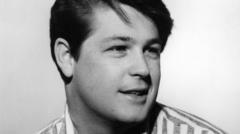A legacy marked by political avoidance leaves many questions unanswered.
Pope Francis: Argentines Mourn a Leader They Never Fully Knew

Pope Francis: Argentines Mourn a Leader They Never Fully Knew
As Argentines grieve, they reflect on the unresolved emotions surrounding Pope Francis’ absence from his homeland.
April 22, 2025 — As the nation of Argentina grapples with the passing of Pope Francis, a profound sense of sorrow is felt deeply among the faithful, compounded by lingering questions about the pontiff's decision to never return to his homeland during his papacy. Days after his death on April 22, 2025, community members gathered in Buenos Aires for an open-air mass, where heartfelt sentiments were shared. Many in attendance echoed sentiments of longing and disappointment at Francis's avoidance of political controversy, which some believe guided his decision to bypass Argentina during his 12-year tenure.
Laura Aguirre, a 50-year-old bakery cashier, expressed her discontent: “I have to be honest, I didn’t like that he never came to Argentina.” Her sentiment resonates with many others who observed how the pontiff resisted being exploited for political gain. “He didn’t want any president to wrap themselves in his cloak, to say ‘I’m the one who brought the pope’,” remarked Sebastián Morales, 37, reflecting both admiration and frustration towards the Argentine-born leader.
The relationship between Francis and various Argentine presidents has been notably complex throughout his papacy. When he served as archbishop in Buenos Aires, Francis encountered significant opposition from then-President Cristina Fernández de Kirchner regarding the legalization of same-sex marriage, though they reconciled later. He also opposed several policies from her successor, Mauricio Macri, particularly regarding issues of social justice.
Currently, as President Javier Milei, who previously labeled the pope an “imbecile,” steps in, he has extended an apology and later met with Francis at the Vatican in a reconciliatory gesture. Milei is expected to attend the pope's funeral on Saturday, a move that illustrates the nuanced and often fraught relationship between them.
While citizens find closure in mourning, the underlying questions of why their native pope chose never to return home remain a poignant part of his legacy, leaving many in the Argentine community to reflect in an emotional silence that speaks volumes.
Laura Aguirre, a 50-year-old bakery cashier, expressed her discontent: “I have to be honest, I didn’t like that he never came to Argentina.” Her sentiment resonates with many others who observed how the pontiff resisted being exploited for political gain. “He didn’t want any president to wrap themselves in his cloak, to say ‘I’m the one who brought the pope’,” remarked Sebastián Morales, 37, reflecting both admiration and frustration towards the Argentine-born leader.
The relationship between Francis and various Argentine presidents has been notably complex throughout his papacy. When he served as archbishop in Buenos Aires, Francis encountered significant opposition from then-President Cristina Fernández de Kirchner regarding the legalization of same-sex marriage, though they reconciled later. He also opposed several policies from her successor, Mauricio Macri, particularly regarding issues of social justice.
Currently, as President Javier Milei, who previously labeled the pope an “imbecile,” steps in, he has extended an apology and later met with Francis at the Vatican in a reconciliatory gesture. Milei is expected to attend the pope's funeral on Saturday, a move that illustrates the nuanced and often fraught relationship between them.
While citizens find closure in mourning, the underlying questions of why their native pope chose never to return home remain a poignant part of his legacy, leaving many in the Argentine community to reflect in an emotional silence that speaks volumes.




















